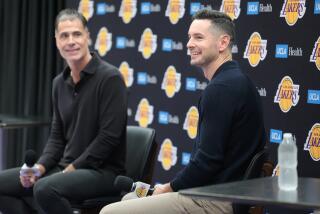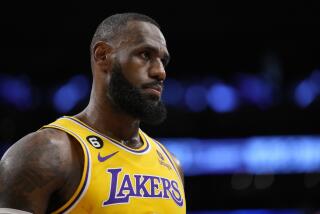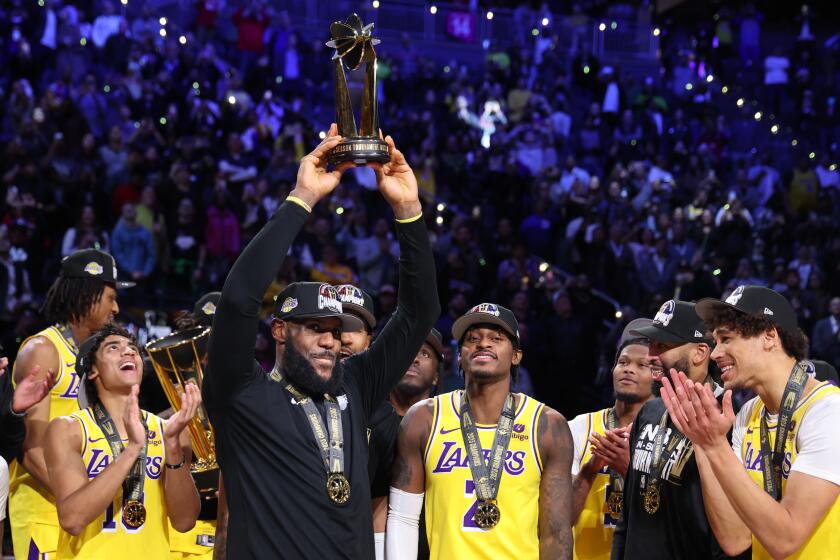It Will Be Something of a Stretch for Jackson to Make Them Champions
Phil Jackson, of sound and limber mind, sometimes walks as if he has a plank glued to his back, running from shoulder blades to tailbone.
During games, he chats with his assistants and bellows at his players from the sideline. He whistles for them to huddle up. When he does, they do not jog, they sprint to him.
And . . . then Jackson . . . pulls . . . himself . . . up . . . from . . . the . . . little . . . folding . . . chair . . . and shuffles . . . forward . . . as if . . . he . . . might . . . never find . . . the balance . . . to . . . rise . . . again.
“I have a fused back,” the Lakers’ new coach said over lunch recently, explaining his teeter-totter walking style and the 1969 surgery that caused him to sit out an entire New York Knick season, but with which he played 11 more seasons.
He has an arthritic hip, but it is not so painful for him to contemplate a hip replacement just yet. Which brings up an immediate thought: He played with that?
“When I walk, it looks like . . . My hips don’t quite move in the right way, because of the fusion. That’s just a part of my angular gait that goes on.
“I have a certain sense of stiffness that’s in my body. But it’s just in my body, it’s not anywhere else.”
No, the man who runs the Lakers these days is very fluid. From Indian philosophy to dealing with Dennis Rodman, from roaming the CBA to winning six NBA titles with the Chicago Bulls, Jackson is one of the most fluid coaches to ever have commanded an NBA bench.
And that broad background, of course, makes him an appropriate man to realign all the grinding gears that have slowed this franchise for years.
Even though Jackson has run his players through a rigorous run of drills and lectures, even though his adherence to the triangle offense means they must change their ways to meet his, and even though he has launched into several of them with a very un-Zenlike gusto . . . Jackson’s whole presence in L.A. is about adjustments and adaptability.
He has been handed a roster he does not particularly love--no strong power forward, not enough athleticism--and must adapt.
He has taken over a team with chemistry problems--superstars on different wavelengths, a big-time shooter looking for a new contract--and must soothe.
He inherits a team of gigantic, and usually failed, expectations, and must address them.
At 54, after a year away from basketball, he has been given a job that has overtaken four other coaches in fairly rapid succession.
And this time, he doesn’t have Michael Jordan or Scottie Pippen.
More fun, in a way, he says with a grin.
“You know, the last couple of years with the Bulls, outside of the fact that Pippen was injured that one year, was basically how to keep the players going, how to get the best out of the players by the rotations or motivation or whatever,” Jackson said.
“This focus is entirely different. My concern was--I’ve been such a laid-back coach over the last couple, three years--was to whether I could get up enough energy to meet this challenge, having an energy to go through a training camp and the intensity of playing so many days in a row, keeping your focus on players so it’s not too intense but yet tense enough to know that they have to build their intensity level. . . .
“But without a doubt, I have that. Just the teaching aspect, the newness, I enjoy with this team.”
With this team, Jackson’s ability to meld personalities will get perhaps its most high-profile test: Can he get Shaquille O’Neal and Kobe Bryant to share respect, a common goal, and ultimately, credit for a championship?
Whether it’s Jackson or natural maturity, the two stars have undergone a recent and noticeable thaw, and Jackson compares them to Jordan and Pippen when they were young and competing with each other.
Jackson hasn’t yet given his players specific books he’d like them to read--as he did in Chicago and will do here later, he says--but his spiritual work, you can see, has already begun.
“We’ve got two leaders,” Jackson said. “Kobe’s going to be a natural leader. He takes the bit and puts it between his teeth and takes off. And that kind of leadership is definitely inspiring.
“That he can be creative as a scorer and do things down the stretch and put a team on his back, makes him a leader, even though he’s not mature enough, in just age maturation, to be on that level where he knows all the nuances of how to do that. . . .
“And Shaq is a leader--he’s always out in front--and Shaq has to find his leadership in being able to do things down the stretch to give his teammates the confidence and give him the natural ascendancy to that position.”
Jackson says he has viewed nothing that would lead him to believe that Bryant, who sat out most of the exhibition season and will be out about the first month of the regular season because of a broken bone in his right hand, and O’Neal will cause him any problems.
“In fact, I like to put them on opposite teams [in practice] to bring out the competitiveness in both of them,” Jackson said. “They both want to win. Sometimes that’s good for the team to get that inspiration.
“Many practices, I put Pippen and Jordan on opposite teams, playing against each other in those terms. That fires it up. What I like to see is that they don’t make it a personal war, but they use their skill to make their teammates better and somehow or another lift that team up.
“I’m starting to see that out of Shaq. I haven’t seen it out of Kobe yet, because we haven’t had enough time in games to see that come out.”
Beyond those two, Jackson freely admits that the Laker roster--especially after the trades of Eddie Jones, Elden Campbell and Nick Van Exel--needs improving.
He has told the players that he will take the time from now until December or January to evaluate what he has, then probably make personnel moves in trouble areas.
“Yeah, we’ll be active,” Jackson said. “At this point, I think we know we have to increase our size. We have to be a bigger team as far as protecting the lane and defending and rebounding.
“And we have to have a little more speed if we’re going to get out and run and do the things that have to be done to get easy baskets. . . .
“Last year, it was quite obvious that they had to move some players that were extremely talented players.”
Jackson campaigned for the off-season pursuit of Charles Oakley, and has addressed the possibility of making a move for semi-retired Bison Dele to solve the power-forward quandary.
He says his relationship with Executive Vice President Jerry West, unlike his brittle association with Bull General Manager Jerry Krause, is marked by openness that allows him to do that.
“Jerry [West] has a very good relationship with the media,” Jackson said. “So it’s not like, ‘Oh gee, I said something that the media got that might deflate our subterfuge or minimize what we’re doing over here while we’re doing something else kind of cloak-and-dagger.
“The Bulls like a lot of cloak-and-dagger. . . . We’re pretty forthright. Jerry likes to be upfront about a lot of things. And that makes it much easier.”
But what about signing Laker owner Jerry Buss’ friend Rodman, whom West did not want to sign last season, which was before Rodman’s series of no-shows, late-shows and sideshows that led to much controversy and his eventual release?
“Jerry and I are, I think, on the same page in this,” Jackson said. “And I may be putting words in his mouth, but the way I feel about it is that we’re going to get the job done, and we’re going to find someone to get the job done.
“Because Dennis would like to play for me, he’d like to play for this team, he knows how to play basketball. If he’d be willing to kind of get himself in a position to do that, there’s an outside chance that it’ll happen. [But] I’m not holding out any kind of promises.
“It’s an issue I actually brought up with Dr. Buss. We talked about it a couple times. Is there a residual in this organization that I need to know about that wants Dennis on this team or feels that we need him on this team or that we can’t do it without him?
“I got no negatives and no positives. I got neither ‘Oh, we want to bring him back,’ or on the other side, ‘No, definitely we won’t bring him back.’
“To this point, it’s, ‘Is Dennis capable of coming back?’ That’s his issue. Our issue is, can we build this team on our developmental program that we’re on right now?”
Many of the Lakers have done everything they could to adapt to the new system and the new philosophies, Jackson said. But, as he expected, several established veterans he did not name have resisted to some degree.
“I can see there’s a couple players out there that are, you know, kind of looking over their shoulders, wondering if they’re going to have to really throw themselves, heart and soul, into this,” Jackson said.
“That’s natural. I think people want to protect themselves and their own identity. They want to be who they are. I think that’s a level that people get to when they’re wondering how much they can give of themselves or how much they can commit to a program, or am I going to be here anyway? Do I want to be a part of something that’ll take so much out of me?
“Basically, the answer is yes.”
Jackson, meanwhile, says that he has enjoyed the limited time he has had to examine the L.A. lifestyle.
“I’ve had a real good time in L.A.,” said Jackson, who went to see Bruce Springsteen at Staples Center and two outdoor concerts recently.
“New York has this kind of electric energy that you feel and this constant rub of people, you want to get behind closed doors and go, ‘Whew, alone at last!’ The energy level picks you up and you get into this kind of buzz in New York.
“Chicago’s more of a Midwest city, you feel it. It kind of shuts down a little bit at night, it’s got its different communities. And yet there’s this intense work ethic that goes on. You just feel like you’re clocking in, and doing our work and . . . there’s this kind of machinery feel to the city.
“And what I’ve experienced here in L.A. is this kind of frenetic freeway fever that goes on, that people have this twitch factor from having to deal with five lanes of traffic and commuting all the time. I’ve tried to stay away from living in a place that I’m going to have to commute.”
So, Jackson has moved to a home in Marina del Rey, near the ocean, and close to the Lakers’ future headquarters in El Segundo.
“I’ve moved into a space,” Jackson said. “I’m real happy. It’s perfect for me.”
(BEGIN TEXT OF INFOBOX / INFOGRAPHIC)
At a Glance
1999 record: 31-19, second in Pacific Division. Eliminated in second round of playoffs, 4-0, by San Antonio.
Who’s new: Coach Phil Jackson, A.C. Green, Ron Harper, John Salley, Brian Shaw, and draft picks Devean George and John Celestand.
Who’s gone: Coach Kurt Rambis, Derek Harper, J.R. Reid, Ruben Patterson, and Sean Rooks.
Projected starters: Guards--Derek Fisher (5.9 points 4.2 assists last season) and Ron Harper (11.2 points, 5.1 rebounds); forwards--Robert Horry (4.9 points, 4.0 rebounds) and Glen Rice (17.5 points, 3.7 rebounds); center--Shaquille O’Neal (26 points, 10.7 rebounds).
Key to season: Can three talented multimillionaires learn to love sharing the ball, love each other and cover up for many other weaknesses? Laker brass brags that O’Neal, Kobe Bryant and Rice are three of top 25 players in the league, but unless they flourish immediately in the triangle offense and play monster defense, lack of depth could submarine this team.
Outlook: Jackson’s teams traditionally start slow, then find rhythm by January or February. That could especially be true with Lakers still scrambling for power forward and Bryant out for first 10-12 games. This team might not reveal its true identity until March.
More to Read
All things Lakers, all the time.
Get all the Lakers news you need in Dan Woike's weekly newsletter.
You may occasionally receive promotional content from the Los Angeles Times.






